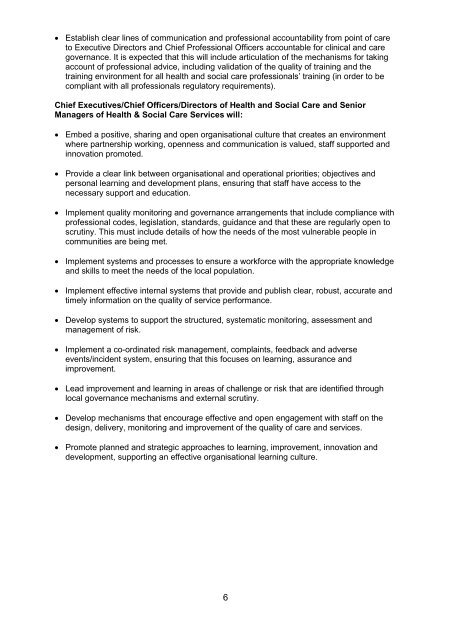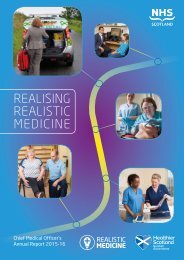Clinical and Care Governance Framework
00491266
00491266
You also want an ePaper? Increase the reach of your titles
YUMPU automatically turns print PDFs into web optimized ePapers that Google loves.
Establish clear lines of communication <strong>and</strong> professional accountability from point of care<br />
to Executive Directors <strong>and</strong> Chief Professional Officers accountable for clinical <strong>and</strong> care<br />
governance. It is expected that this will include articulation of the mechanisms for taking<br />
account of professional advice, including validation of the quality of training <strong>and</strong> the<br />
training environment for all health <strong>and</strong> social care professionals’ training (in order to be<br />
compliant with all professionals regulatory requirements).<br />
Chief Executives/Chief Officers/Directors of Health <strong>and</strong> Social <strong>Care</strong> <strong>and</strong> Senior<br />
Managers of Health & Social <strong>Care</strong> Services will:<br />
Embed a positive, sharing <strong>and</strong> open organisational culture that creates an environment<br />
where partnership working, openness <strong>and</strong> communication is valued, staff supported <strong>and</strong><br />
innovation promoted.<br />
Provide a clear link between organisational <strong>and</strong> operational priorities; objectives <strong>and</strong><br />
personal learning <strong>and</strong> development plans, ensuring that staff have access to the<br />
necessary support <strong>and</strong> education.<br />
Implement quality monitoring <strong>and</strong> governance arrangements that include compliance with<br />
professional codes, legislation, st<strong>and</strong>ards, guidance <strong>and</strong> that these are regularly open to<br />
scrutiny. This must include details of how the needs of the most vulnerable people in<br />
communities are being met.<br />
Implement systems <strong>and</strong> processes to ensure a workforce with the appropriate knowledge<br />
<strong>and</strong> skills to meet the needs of the local population.<br />
Implement effective internal systems that provide <strong>and</strong> publish clear, robust, accurate <strong>and</strong><br />
timely information on the quality of service performance.<br />
Develop systems to support the structured, systematic monitoring, assessment <strong>and</strong><br />
management of risk.<br />
Implement a co-ordinated risk management, complaints, feedback <strong>and</strong> adverse<br />
events/incident system, ensuring that this focuses on learning, assurance <strong>and</strong><br />
improvement.<br />
Lead improvement <strong>and</strong> learning in areas of challenge or risk that are identified through<br />
local governance mechanisms <strong>and</strong> external scrutiny.<br />
Develop mechanisms that encourage effective <strong>and</strong> open engagement with staff on the<br />
design, delivery, monitoring <strong>and</strong> improvement of the quality of care <strong>and</strong> services.<br />
Promote planned <strong>and</strong> strategic approaches to learning, improvement, innovation <strong>and</strong><br />
development, supporting an effective organisational learning culture.<br />
6



